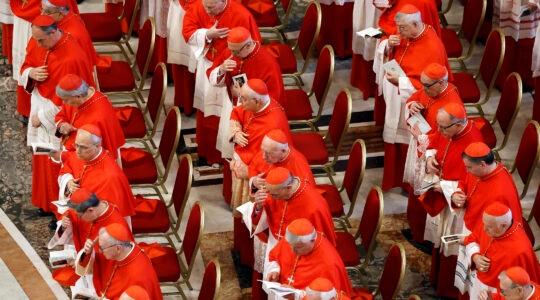JERUSALEM, Aug. 5 (JTA) — A Reform Jewish woman has won the backing of Israel’s top court to take her place on a local religious council. The High Court of Justice ruled Tuesday that the Religious Affairs Ministry must allow Joyce Brenner to sit on the Netanya council. The ministry was given one week to register Brenner and
make her appointment official. The court also ordered the ministry to pay the Reform movement’s Israel Religious Action Center more than $8,000 compensation for legal costs related to the case. Uri Regev, the center’s director, called the ruling “a moral victory” in the non-Orthodox movements’ campaign to gain legal recognition in Israel. The court has ruled on several occasion that non-Orthodox representatives cannot be barred from religious councils on the basis of their religious beliefs, but no religious council has permitted a Reform or Conservative representative to participate in its proceedings. The Reform movement voiced gratification with the court’s quick action on the Brenner case, which was filed in June. But the ministry indicated that it would oppose this latest ruling. “Our ministry opposes the inclusion of representatives who declare, in advance, that their intention” is to provide religious services from a Reform perspective, and not from the Orthodox “perspective accepted by more than 99 percent of the population of the State of Israel,” said a spokesman for the Religious Affairs Ministry. The local religious councils, supervised by the Religious Affairs Ministry, have exclusive jurisdiction over marriage, kashrut, burial and other religious matters for all Jews living in Israel. Forty-five percent of each religious council is appointed by the local municipality, with another 45 percent appointed by the religious affairs minster and 10 percent by the local rabbinate, an Orthodox body. Another petition, pertaining to religious councils in Jerusalem, Tel Aviv, Haifa and Tivon, is pending. That petition, filed last month by the Reform and Conservative movements, asked the court to force the ministry to permit non-Orthodox representatives to sit on the religious councils in those four cities. The ministry spokesman indicated that the Orthodox parties may try to block appointments of non-Orthodox representatives to religious councils through legislation in the Knesset. Regev acknowledge that Orthodox parliamentarians might try to introduce such a bill, but “it’s not at all clear that they have the votes to pass it. They shouldn’t be too confident.”
JTA has documented Jewish history in real-time for over a century. Keep our journalism strong by joining us in supporting independent, award-winning reporting.





